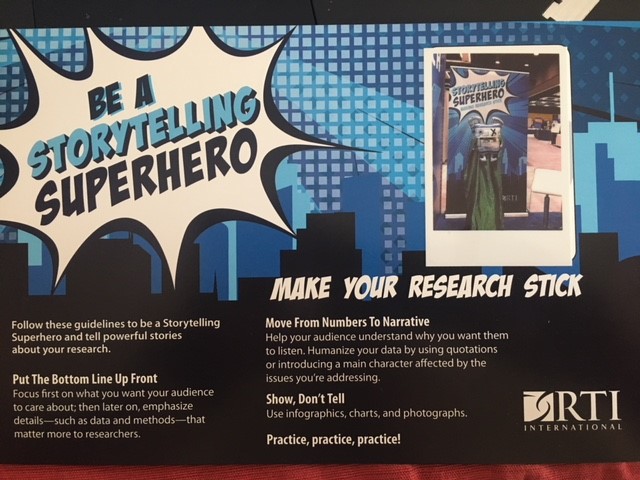“Will Evidence Matter in a World of Misinformation?” That was the titular question of a plenary session at the most recent AcademyHealth Annual Research Meeting (ARM) held this past June in Seattle.
The brief answer is “yes.”
Evidence always matters. The more complex question is, “How do we make the evidence rise to the top amid shortening attention spans, a 24-hour news cycle, and so much competition from misinformation?” Beginning at the 2017 ARM held in New Orleans and continuing the conversation again at the 2018 event, RTI researchers embarked on a journey for attendees to help answer this question.
As we spoke with attendees at this year’s event—all of them anxious to tackle the challenge of providing new and meaningful evidence to the health services research canon—we all struggled with how to make our research matter. How do we make our detailed, methodologically complex work relatable? How do we get policymakers, the news media, or our friends and family to care? RTI posed the latter question at last year’s event, and our crowdsourcing revealed a few key strategies for translating research into stories.
Telling stories with our findings not only helps us make our research relatable but also reaches diverse audiences and settings—ranging from family dinner tables to policymakers. These tips also apply across dissemination channels, ranging from scholarly journals to social media. In today’s world, social media platforms—such as Twitter, Facebook, and LinkedIn—are powerful tools that enable us to put our research in front of diverse audiences with just a few mouse clicks. These platforms require us to communicate our findings in short, concise ways—such as infographics or quotes from qualitative interviews—to help people understand why findings from sources like claims analyses or literature reviews matter.
But having a story is only the first step—you need to tell it.
At this year’s AcademyHealth Annual Research Meeting, we asked researchers to pledge to become “Storytelling Superheroes.” We talked with more than 50 attendees—all with different background and research interests, all ready to tackle the challenge of effectively communicating our exciting research through storytelling.

We need to tell our respective research stories not only to prestigious journals and policymakers but to our fellow researchers. Another plenary session, “Innovation and the Future,” challenged us to think about how to engage peers and colleagues whose experience and expertise is different than our own. Partnerships and synergies across backgrounds and disciplines will be critical to ensuring health services research remains relevant and impactful. How can we start reaching out to one another early and often? How can we overcome the incentives to keep our research to ourselves until publication?
Today’s problems are ever more complex and we will need each other—not only to solve those problems, but also to bring our evidence to bear in a world with so much misinformation. Evidence matters. It is up to all of us to make sure we communicate in ways that facilitate conversations, be they at a conference, the dinner table, the classroom, or the local coffee shop where two old friends are catching up.
The opinions expressed in this blog post are the authors’ own and do not necessarily reflect the view of AcademyHealth.
Organizational Affiliates are a critical link in AcademyHealth’s ability to effectively advocate for the field, and support the future field of health services researchers. Organizational Affiliates gain visibility among AcademyHealth membership, enjoy unique networking opportunities, and benefit from event discounts. Click here to learn more.